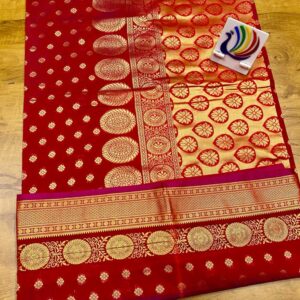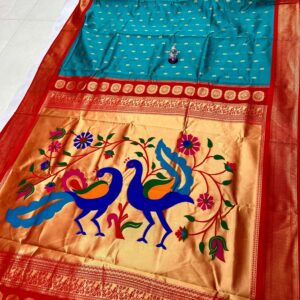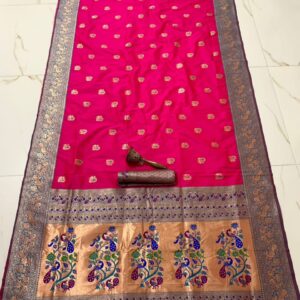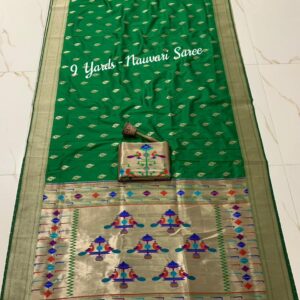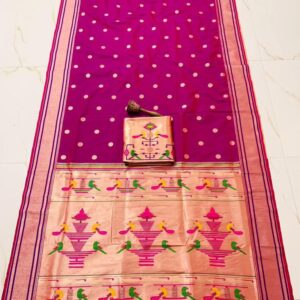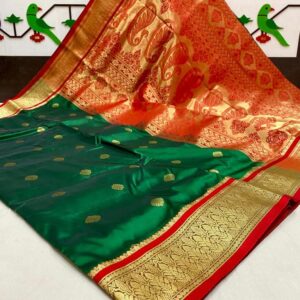Nauvari Saree
Showing all 6 results
9 War Paithani Saree by RugvedCollection
₹1,950.00 Select options This product has multiple variants. The options may be chosen on the product page9 Yard Dhruvika Paithani Saree
₹1,999.00 Select options This product has multiple variants. The options may be chosen on the product page9 Yards Nauvari Saree – Elevate Style
₹2,499.00 Select options This product has multiple variants. The options may be chosen on the product pagenauvari sadi – 9 yards Paithani Saree
₹2,499.00 Select options This product has multiple variants. The options may be chosen on the product pageNauvari Sadi – A Traditional Maharashtrian Attire
₹2,499.00 Select options This product has multiple variants. The options may be chosen on the product pagePaithani Nauvari Saree
₹2,950.00 Select options This product has multiple variants. The options may be chosen on the product page
The Quintessential Nauvari Saree: A Timeless Marathi Attire
Introduction to Nauvari Saree
The Nauvari Saree, an iconic attire from Maharashtra, holds a significant place in Indian fashion. Its name, derived from “Nauvari,” meaning nine yards, indicates the length of the fabric used. This saree is renowned for its unique draping style, which allows free movement while exuding elegance and grace. Traditionally worn by women in Maharashtra, the Nauvari Saree represents cultural heritage and timeless beauty.
Historical Significance
The Nauvari Saree traces its roots back to the Maratha Empire. Historically, it was the attire of choice for women warriors who needed flexibility in movement. The draping style, resembling a trouser-like appearance, was practical for combat and daily chores. Over time, it became a symbol of strength and valor among Maharashtrian women. The historical context of the Nauvari underscores its significance as more than just a piece of clothing; it represents resilience, tradition, and cultural pride.
Cultural Relevance
In Maharashtrian culture, the Nauvari is more than a garment; it is a cultural emblem. Worn during festivals, weddings, and religious ceremonies, it signifies respect for tradition. The saree is often adorned with intricate jewelry, enhancing its regal appearance. During the Ganesh Chaturthi festival, women wear the Nauvari to participate in traditional dances and processions, showcasing their cultural heritage. The saree’s continued relevance in cultural practices highlights its enduring legacy.
Regional Variations
While the Nauvari is predominantly associated with Maharashtra, different regions have distinct variations. The Brahmani Nauvari, worn by Brahmin women, features a more modest and traditional drape. The Marathmoli Nauvari, popular among Maratha women, is known for its vibrant colors and elaborate patterns. The Dhangari Nauvari, worn by shepherd communities, is simpler and more practical for daily wear. These regional variations add to the richness and diversity of the Nauvari Saree tradition.
Draping Style
The unique draping style of the Nauvari sets it apart from other sarees. Unlike the conventional six-yard saree, the Nauvari is draped in a way that resembles trousers, allowing ease of movement. The saree is wrapped around the waist, with pleats tucked in at the back, and the remaining fabric draped over the shoulder. This style, known as the Kashta drape, is both functional and aesthetically pleasing. Mastering the draping technique is an art that has been passed down through generations.
The Elegance of Nauvari Saree
The Nauvari epitomizes elegance and grace. Its distinctive drape, combined with rich fabrics and intricate embellishments, makes it a timeless piece of attire that continues to captivate women of all ages.
Adornments and Embellishments
The beauty of the Nauvari lies in its intricate adornments. Traditional Nauvari Sarees are often embellished with zari work, gold and silver threads woven into the fabric to create stunning patterns. The saree may also feature intricate embroidery, mirror work, and beadwork. These embellishments enhance the visual appeal, making each saree a work of art. Paithani Nauvari, with their rich borders and pallu, are particularly famous for their exquisite craftsmanship.
Graceful Carriage
Wearing a Nauvari demands a certain poise and elegance. The saree’s unique draping style, which combines the grace of a saree with the practicality of trousers, allows the wearer to carry herself with confidence and dignity. The pleats and folds create a flowing silhouette, while the intricate designs add a touch of opulence. The Nauvari Saree not only enhances the wearer’s beauty but also reflects her cultural identity and pride.
Occasions and Festivals
The Nauvari Saree is a staple during Maharashtrian festivals and ceremonies. During Ganesh Chaturthi, women don the Nauvari Saree to participate in traditional dances like the Lezim and Dholki. In weddings, the bride often wears a richly adorned Nauvari, symbolizing purity and tradition. The saree is also worn during other festivals like Diwali and Gudi Padwa, showcasing its versatility and cultural significance. Each occasion provides an opportunity to celebrate tradition and showcase the timeless beauty of the Nauvari Saree.
Nauvari Saree: From Tradition to Modern Trends
The Nauvari Saree has gracefully transitioned from traditional attire to a contemporary fashion statement. Designers and fashion enthusiasts have embraced its unique style, blending traditional elements with modern trends.
Contemporary Styling
Modern fashion has seen the incorporation of the Nauvari into contemporary styles. Designers experiment with fabrics, colors, and embellishments to create innovative versions of the traditional saree. Some styles include pairing the Nauvari with trendy blouses, experimenting with unconventional draping techniques, and incorporating modern motifs. These contemporary adaptations make the Nauvari Saree appealing to younger generations while preserving its traditional essence.
Influence on Fashion Industry
The influence of the Nauvari Saree extends beyond cultural boundaries, impacting the global fashion industry. Renowned designers have showcased Nauvari-inspired collections on international runways, drawing attention to its unique draping style and intricate designs. Fashion shows and exhibitions often feature Nauvari Sarees, highlighting their versatility and timeless appeal. The saree’s influence is also evident in Bollywood, where actresses don Nauvari Sarees in films and public appearances, popularizing it among fashion enthusiasts.
Revival and Global Recognition
Efforts to revive traditional crafts have brought the Nauvari Saree into the global spotlight. Cultural organizations and fashion houses collaborate to promote the saree’s rich heritage, organizing exhibitions and workshops. The saree has gained recognition on international platforms, with fashion influencers and celebrities endorsing it. The global recognition of the Nauvari Saree underscores its timeless appeal and cultural significance, ensuring its legacy for future generations.
How to Drape a Nauvari Saree
Draping a Nauvari Saree is an art that requires practice and precision. Here is a step-by-step guide:
- Prepare the Saree: Start by tucking the saree into the waist on the right side, bringing it around the waist to the left side.
- Create Pleats: Make pleats at the center and tuck them into the waistband at the back, ensuring they are even and neat.
- Drape the Pallu: Take the remaining fabric over the left shoulder, letting it fall gracefully down the back.
- Adjust and Secure: Adjust the pleats and pallu to ensure a comfortable fit. Use pins to secure the saree in place, if necessary.
With these steps, you can master the traditional Kashta drape, carrying the Nauvari Saree with grace and elegance.

